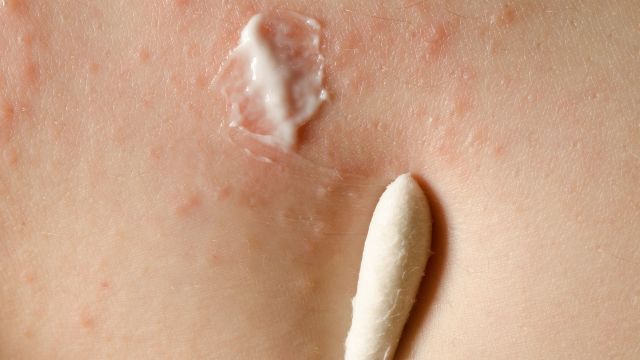Atopic dermatitis is a skin condition that affects people of all ages, and is fairly common among children and teenagers. The majority of people who have atopic dermatitis first show symptoms before the age of five.
As anyone who has had any experience with atopic dermatitis knows, the major symptom of the condition is an itchy skin rash. The rash may appear red, covered in bumps and/or flaky. The itching associated with this rash can be very intense and distressing. Scratching can cause damage to the skin—which can contribute to bacterial infections and also cause scarring and thickening of the skin.
This rash can appear on any part of the body, but tends to affect people of different ages on different areas of the body. For infants, the rash is often seen on the arms and legs, scalps and cheeks. For children, teenagers and adults, atopic dermatitis typically affects parts of the body that bend, such as the elbows, inner knees, ankles and wrists—but it can also be found on the neck, scalp, torso and outer limbs.
Mild, moderate and severe
Like other health conditions, atopic dermatitis is often described in terms of severity, with labels like mild, moderate and severe. Labels like “mild-to-moderate” and “moderate-to-severe” are used in the indications for some therapies used to treat atopic dermatitis, and consequently some treatments are advertised with these labels. If you’ve heard atopic dermatitis described in these terms, you may wonder exactly what they mean.
There is currently no universally agreed upon scale or system for measuring the severity of atopic dermatitis. There are more than 25 different scales, all of which use different methods of determining severity and have different scoring methods. However, these are mostly used by researchers in clinical studies, and are not typically used by healthcare providers.
Working with your pediatrician
The severity of atopic dermatitis is something that parents and children will work with their pediatrician to determine. Assessing severity may be useful when deciding on a treatment, and should consider both the physical symptoms of atopic dermatitis as well as the ways that the condition impacts a person’s life.
Some of the factors that should be considered are:
- The number of areas of affected skin and the size of those areas. Also, what areas are affected—is the affected skin visible (such as on the face) or in a particularly sensitive area of the body?
- The emotional impact atopic dermatitis has on your child’s life. To what degree does atopic dermatitis interfere with sleep, normal activities (like school or sports), social life, psychological and emotional well-being?
- The physical symptoms. How frequent and intense is the itching? Is the rash painful? Are there cracks in the skin, scarring or changes to the skin? Is the skin blistered, bleeding, weeping or oozing?
- Infections. Because of impaired skin barrier function and damage to the skin, people with atopic dermatitis are more susceptible to infections from bacteria and viruses. How often do infections occur?
- The treatments—and doses of those treatments—that are needed to get symptoms under control.
It is important to keep in mind that atopic dermatitis is a little different for every person—people experience different severity, react to different triggers and respond to different treatments. If a treatment or an approach to treatment is not working, it is important that you and your child work with your pediatrician to find ways to adjust or improve the treatment plan. While there is no cure for atopic dermatitis, there are numerous treatment options available.






